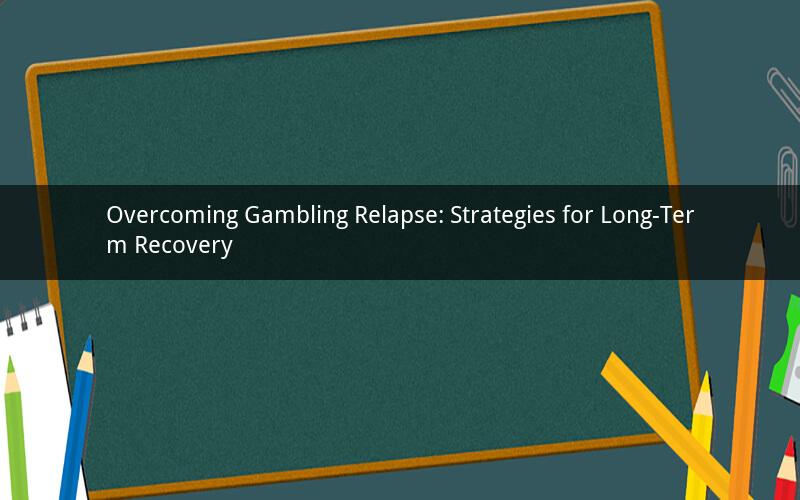
Introduction:
Gambling relapse is a common challenge faced by individuals in recovery. It is crucial to understand the triggers, symptoms, and effective strategies to deal with gambling relapse. This article explores various approaches to help individuals maintain long-term recovery from gambling addiction.
1. Identifying Triggers for Relapse:
Understanding the triggers that may lead to a gambling relapse is the first step in combating this issue. Triggers can vary from person to person but commonly include stress, financial difficulties, social pressure, and emotional distress. Recognizing these triggers is essential for developing a personalized relapse prevention plan.
2. Symptoms of Relapse:
Identifying the symptoms of relapse can help individuals recognize the early signs and take appropriate action. Symptoms may include a strong urge to gamble, increased anxiety, feelings of guilt or shame, and a decrease in motivation to maintain recovery. Recognizing these symptoms can lead to timely intervention and prevent a full-blown relapse.
3. Building a Support System:
Creating a strong support system is vital in dealing with gambling relapse. This support system can include family members, friends, therapists, and support groups. Surrounding oneself with individuals who understand the challenges of gambling addiction and offer encouragement and guidance can significantly reduce the risk of relapse.
4. Coping Skills for Stress Management:
Stress is a common trigger for gambling relapse. Learning effective coping skills can help individuals manage stress without turning to gambling. Techniques such as mindfulness, meditation, exercise, and engaging in hobbies can provide healthy alternatives to relieve stress and maintain sobriety.
5. Developing a Relapse Prevention Plan:
Creating a personalized relapse prevention plan is essential for long-term recovery. This plan should include specific strategies and actions to be taken when faced with triggers or symptoms of relapse. It may involve identifying safe places to go, creating a list of coping skills, and having a support person to call during times of vulnerability.
6. Seeking Professional Help:
If a gambling relapse occurs, seeking professional help is crucial. Therapists specializing in addiction treatment can provide guidance, support, and tools to overcome the relapse. Therapy sessions may focus on identifying underlying issues contributing to the relapse, developing coping skills, and creating a plan to prevent future relapses.
7. Celebrating Progress and Maintaining Sobriety:
Celebrating milestones and progress is vital in maintaining sobriety. Recognizing and acknowledging the efforts made to stay on track can provide motivation and reinforce positive behaviors. Maintaining a focus on long-term recovery rather than short-term setbacks is crucial for sustained sobriety.
8. Education and Self-Awareness:
Continued education about gambling addiction and its effects on mental and financial well-being is important. Understanding the risks associated with gambling and the consequences of relapse can help individuals stay vigilant and proactive in their recovery journey. Self-awareness is also crucial in recognizing personal patterns and triggers that may lead to relapse.
9. Building Financial Stability:
Financial difficulties often contribute to gambling relapse. Developing a budget, seeking financial counseling, and finding stable employment can help individuals build financial stability and reduce the temptation to gamble. Creating a financial safety net can provide a sense of security and reduce the urge to turn to gambling as a solution to financial problems.
10. Embracing a Healthy Lifestyle:
A healthy lifestyle, including a balanced diet, regular exercise, and adequate sleep, can positively impact mental and physical well-being. These lifestyle choices can reduce stress, improve mood, and provide a sense of accomplishment, making it easier to maintain sobriety.
Q1: What are some common triggers for gambling relapse?
A1: Common triggers include stress, financial difficulties, social pressure, and emotional distress.
Q2: How can a support system help in dealing with gambling relapse?
A2: A support system provides encouragement, guidance, and a safe space to share feelings and experiences. It can help individuals stay accountable and seek help when needed.
Q3: What coping skills can be effective in managing stress and preventing relapse?
A3: Effective coping skills include mindfulness, meditation, exercise, engaging in hobbies, and seeking support from friends and family.
Q4: Why is it important to seek professional help if a gambling relapse occurs?
A4: Seeking professional help allows individuals to address underlying issues contributing to the relapse, develop coping skills, and create a plan to prevent future relapses.
Q5: How can a healthy lifestyle contribute to maintaining sobriety?
A5: A healthy lifestyle, including a balanced diet, regular exercise, and adequate sleep, can improve mental and physical well-being, reduce stress, and provide a sense of accomplishment, making it easier to maintain sobriety.